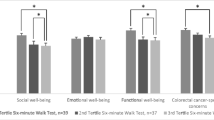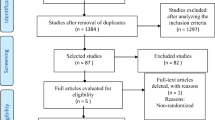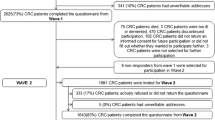Abstract
Purpose
To examine the effects of a home-based exercise program on quality of life (QOL), psychological health, and the level of physical activity (PA) in colorectal cancer survivors.
Methods
Seventy-one colorectal cancer survivors were randomized into either a home-based exercise group (N = 37) or control group (N = 34). The home-based exercise program included unsupervised walking, stationary bike, or swimming for aerobic exercise, as well as resistance exercise DVDs, a pedometer, and an exercise log. The Functional Assessment of Cancer Therapy-Colorectal, Functional Assessment of Chronic Illness Therapy-Fatigue Scale, patient health questionnaire, and Godin Leisure-Time Exercise Questionnaire were used to assess QOL, fatigue, depression, and PA levels.
Results
Among the 71 participants, 30 in the exercise group and 28 in the control group completed the study. The change in the QOL between the intervention and control groups was insignificant. However, QOL was significantly improved in the exercise group (QOL, p = 0.024). Sub-domain of QOL, emotional well-being, and trial outcome index-physical/functional/colorectal (p = 0.015 and p = 0.035, respectively) were improved in the exercise group. The level of PA was significantly increased after 12 weeks in the exercise group (97.0 ± 188.5 vs. 332.6 ± 306.1, p < 0.001), and the change significantly differed compared with the control group (mean change 235.6 vs. 16.3, p < 0.001).
Conclusions
The home-based exercise program may improve the QOL and psychological health in colorectal cancer survivors. We have demonstrated that the home-based exercise program was effective in increasing the level of PA in colorectal cancer survivors.


Similar content being viewed by others
References
GLOBOCAN (2008) Cancer incidence, mortality and prevalence worldwide in 2008. 2012-02-26]. http://globocan. iarc. fr. 2013
American Cancer Society (2011) Global cancer facts and figures. 2nd Edition. Atlanta, GA: American Cancer Society. 2011
Coleman MP, Rachet B, Woods LM, Mitry E, Riga M, Cooper N, Quinn MJ, Brenner H, Estève J (2004) Trends and socioeconomic inequalities in cancer survival in England and Wales up to 2001. Br J Cancer 90(7):1367–1373
Courneya KS, Friedenreich CM, Sela RA, Quinney HA, Rhodes RE, Handman M (2003) The group psychotherapy and home-based physical exercise (group-hope) trial in cancer survivors: physical fitness and quality of life outcomes. Psychooncology 12(4):357–374
Andrykowski MA, Lykins E, Floyd A (2008) Psychological health in cancer survivors. Semin Oncol Nurs 24(3):193–201
Mitchell AJ, Chan M, Bhatti H, Halton M, Grassi L, Johansen C, Meader N (2011) Prevalence of depression, anxiety, and adjustment disorder in oncological, haematological, and palliative-care settings: a meta-analysis of 94 interview-based studies. Lancet Oncol 12(2):160–174
Zabora J, BrintzenhofeSzoc K, Curbow B, Hooker C, Piantadosi S (2001) The prevalence of psychological distress by cancer site. Psychooncology 10(1):19–28
Sharma A, Walker AA, Sharp DM, Monson JRT, Walker LG (2007) Psychosocial factors and quality of life in colorectal cancer. Surgeon 5(6):344–354
Lee DH, Kim JY, Lee MK, Lee C, Min JH, Jeong DH, Lee JW, Chu SH, Meyerhardt JA, Ligibel J, Jones LW, Kim NK, Jeon JY (2013) Effects of a 12-week home-based exercise program on the level of physical activity, insulin, and cytokines in colorectal cancer survivors: a pilot study. Support Care Cancer 21(9):2537–2545
Ligibel JA, Meyerhardt J, Pierce JP, Najita J, Shockro L, Campbell N, Newman VA, Barbier L, Hacker E, Wood M, Marshall J, Paskett E, Shapiro C (2012) Impact of a telephone-based physical activity intervention upon exercise behaviors and fitness in cancer survivors enrolled in a cooperative group setting. Breast Cancer Res Treat 132(1):205–213
Morey MC, Snyder DC, Sloane R, Cohen HJ, Peterson B, Hartman TJ, Miller P, Mitchell DC, Demark-Wahnefried W (2009) Effects of home-based diet and exercise on functional outcomes among older, overweight long-term cancer survivors: RENEW: a randomized controlled trial. JAMA 301(18):1883–1891
Courneya KS (2001) Exercise interventions during cancer treatment: biopsychosocial outcomes. Exerc Sport Sci Rev 29(2):60–64
Courneya KS, Friedenreich CM, Quinney HA et al (2003) A randomized trial of exercise and quality of life in colorectal cancer survivors. Eur J Cancer Care (Engl) 12(4):347–357
Pinto BM, Papandonatos GD, Goldstein MG, Marcus BH, Farrell N (2013) Home-based physical activity intervention for colorectal cancer survivors. Psychooncology 22(1):54–64
Ligibel JA, Partridge A, Giobbie-Hurder A, Campbell N, Shockro L, Salinardi T, Winer EP (2010) Physical and psychological outcomes among women in a telephone-based exercise intervention during adjuvant therapy for early stage breast cancer. J Women’s Health (Larchmt) 19(8):1553–1559
Pinto BM, Frierson GM, Rabin C, Trunzo JJ, Marcus BH (2005) Home-based physical activity intervention for breast cancer patients. J Clin Oncol 23(15):3577–3587
Spector D, Deal AM, Amos KD, Yang H, Battaglini CL (2014) A pilot study of a home-based motivational exercise program for African American breast cancer survivors: clinical and quality-of-life outcomes. Integr Cancer Ther 13(2):121–132
Yang CY, Tsai JC, Huang YC, Lin CC (2011) Effects of a home-based walking program on perceived symptom and mood status in postoperative breast cancer women receiving adjuvant chemotherapy. J Adv Nurs 67(1):158–168
Lee MK, Kim JY, Kim DI, Kang DW, Park JH, Ahn KY, in Yang H, Lee DH, Roh YH, Lee JW, Chu SH, Meyerhardt JA, Jones LW, Kim NK, Jeon JY (2017) Effect of home-based exercise intervention on fasting insulin and Adipocytokines in colorectal cancer survivors: a randomized controlled trial. Metabolism 76:23–31
Meyerhardt JA, Giovannucci EL, Ogino S, Kirkner GJ, Chan AT, Willett W, Fuchs CS (2009) Physical activity and male colorectal cancer survival. Arch Intern Med 169(22):2102–2108
Meyerhardt JA, Heseltine D, Niedzwiecki D et al (2006) Impact of physical activity on cancer recurrence and survival in patients with stage III colon cancer: findings from CALGB 89803. J Clin Oncol 24(22):3535–3541
Yoo HJ, Kim JC, Eremenco S, Han OS (2005) Quality of life in colorectal cancer patients with colectomy and the validation of the Functional Assessment of Cancer Therapy-Colorectal (FACT-C), Version 4. J Pain Symptom Manag 30(1):24–32
Yost KJ, Cella D, Chawla A et al (2005) Minimally important differences were estimated for the Functional Assessment of Cancer Therapy-Colorectal (FACT-C) instrument using a combination of distribution- and anchor-based approaches. J Clin Epidemiol 58(12):1241–1251
Cella D (1997) The Functional Assessment of Cancer Therapy-Anemia (FACT-An) Scale: a new tool for the assessment of outcomes in cancer anemia and fatigue. Semin Hematol 34(3 Suppl 2):13–19
Cella D, Lai JS, Chang CH, Peterman A, Slavin M (2002) Fatigue in cancer patients compared with fatigue in the general United States population. Cancer 94(2):528–538
Gilbody S, Richards D, Brealey S, Hewitt C (2007) Screening for depression in medical settings with the Patient Health Questionnaire (PHQ): a diagnostic meta-analysis. J Gen Intern Med 22(11):1596–1602
Godin G, Jobin J, Bouillon J (1986) Assessment of leisure time exercise behavior by self-report: a concurrent validity study. Can J Public Health 77(5):359–362
Cella D, Eton DT, Lai JS, Peterman AH, Merkel DE (2002) Combining anchor and distribution-based methods to derive minimal clinically important differences on the Functional Assessment of Cancer Therapy (FACT) anemia and fatigue scales. J Pain Symptom Manag 24(6):547–561
Buffart LM, Thong MS, Schep G, et al (2012) Self-reported physical activity: its correlates and relationship with health-related quality of life in a large cohort of colorectal cancer survivors. PLoS One 7(5):e36164
Lynch BM, Cerin E, Owen N, Hawkes AL, Aitken JF (2008) Prospective relationships of physical activity with quality of life among colorectal cancer survivors. J Clin Oncol 26(27):4480–4487
Peddle CJ, Au HJ, Courneya KS (2008) Associations between exercise, quality of life, and fatigue in colorectal cancer survivors. Dis Colon Rectum 51(8):1242–1248
Grimmett C, Bridgewater J, Steptoe A, Wardle J (2011) Lifestyle and quality of life in colorectal cancer survivors. Qual Life Res 20(8):1237–1245
Lewis C, Xun P, He K (2014) Physical activity in relation to quality of life in newly diagnosed colon cancer patients: a 24-month follow-up. Qual Life Res 23(8):2235–2246
Chung JY, Lee DH, Park JH, Lee MK, Kang DW, Min J, Kim DI, Jeong DH, Kim NK, Meyerhardt JA, Jones LW, Jeon JY (2013) Patterns of physical activity participation across the cancer trajectory in colorectal cancer survivors. Support Care Cancer 21(6):1605–1612
Blanchard CM, Courneya KS, Stein K, American Cancer Society’s SCS-II (2008) Cancer survivors’ adherence to lifestyle behavior recommendations and associations with health-related quality of life: results from the American Cancer Society’s SCS-II. J Clin Oncol 26(13):2198–2204
Park JH, Lee J, Oh M, Park H, Chae J, Kim DI, Lee MK, Yoon YJ, Lee CW, Park S, Jones LW, Kim NK, Kim SI, Jeon JY (2015) The effect of oncologists’ exercise recommendations on the level of exercise and quality of life in survivors of breast and colorectal cancer: a randomized controlled trial. Cancer 121(16):2740–2748
Jones LW, Courneya KS (2002) Exercise counseling and programming preferences of cancer survivors. Cancer Pract 10(4):208–215
Acknowledgments
This research was supported by a grant from the National R&D program for Cancer Control, Ministry of Health and Welfare, Republic of Korea (1631020) and the Ministry of Education of the Republic of Korea and the National Research Foundation of Korea (NRF-2015S1A5B8036349). This research was also partially supported by the Graduate School of YONSEI University Research Scholarship Grants in 2017.
Author information
Authors and Affiliations
Corresponding author
Ethics declarations
Conflict of interest
The authors declare that they have no conflict of interest.
Additional information
Publisher’s Note
Springer Nature remains neutral with regard to jurisdictional claims in published maps and institutional affiliations.
Rights and permissions
About this article
Cite this article
Kim, J.Y., Lee, M.K., Lee, D.H. et al. Effects of a 12-week home-based exercise program on quality of life, psychological health, and the level of physical activity in colorectal cancer survivors: a randomized controlled trial. Support Care Cancer 27, 2933–2940 (2019). https://doi.org/10.1007/s00520-018-4588-0
Received:
Accepted:
Published:
Issue Date:
DOI: https://doi.org/10.1007/s00520-018-4588-0




